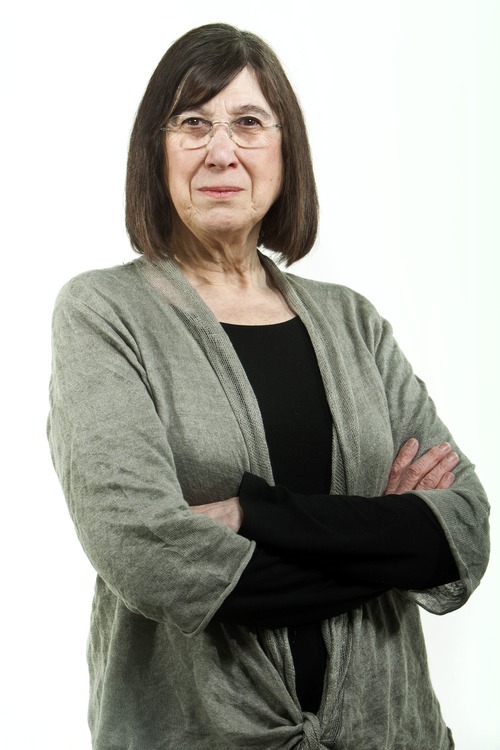This is an archived article that was published on sltrib.com in 2014, and information in the article may be outdated. It is provided only for personal research purposes and may not be reprinted.
By summer 1938 in Nazi Germany, Jews had already lost most of their civil rights. They were required to register their property and were forbidden to work in any commercial, industrial or government service. Physicians' licenses were revoked; lawyers were barred from practicing law. Jewish men and women with Aryan-sounding first names were "obliged" to add the middle name of Israel or Sara on identification cards, and on Oct. 5, all Jewish passports were invalidated until the red letter "J" was stamped on them.
For 5-year-old Hans Joachim Praiss (John Price), life in Spandau, Germany, was "normal." He attended public school, toted a leather knapsack on his back, sneaked into his father's movie theater with friends, devoured pastries and was only mildly perplexed when one parent or the other accompanied him the two blocks from home to Hebrew school.
"My father was a German citizen, a middleweight prizefighter in his youth, strong willed and silent," said the Salt Lake developer and former ambassador. "There were early warning signs that Jews were in danger, but I think he didn't want my brother Wolfgang or me to worry about it."
Selmann Praiss invested in a city block of stores in a Jewish district of Spandau. He hired many relatives and rented out shops. "The building had a grassy courtyard in the middle and apartments on the second floor where we lived," Price remembered.
The family enterprises, including men's clothing, dry goods and a haberdashery, thrived until 1936-37 when economic restrictions and the boycott on Jewish businesses sounded the death rattle.
"People tried to convince my father to leave," Price said. "He had helped two brothers immigrate to America. He had seen relatives suddenly disappear. But he believed Germany was going to oust Hitler. It didn't work out that way."
On Nov. 9, 1938, Nazi party officials, the Sturmabteilung terrorist militia and members of Hitler Youth unleashed a wave of violent anti-Jewish pogroms called Kristallnacht, "The Night of Broken Glass," throughout Germany.
They annexed Austria and areas of German-occupied Czechoslovakia. They beat, killed and imprisoned hundreds of Jews. Torahs and synagogues were torched.
In Spandau, the grand 296-seat synagogue built in 1895 was reduced to rubble.
Carrying bats, crowds stormed into one Jewish-owned store after another, including the Praiss'. They smashed glass storefronts and looted merchandise, marking walls, display cases and broken goods with glaring yellow Stars of David.
The Praisses were in their apartment. "The sounds were frightening," Price recalled. "My mother [Margarete] quickly closed the curtains and turned off the lights. My father covered our heads and prayed. We hid like we didn't exist, and fortunately they didn't have ladders."
In the aftermath of the terror, Margarete swept up the shattered glass. Selmann boarded broken shop windows. He applied for insurance that never came and paid a fine. Forced to wear a yellow star sewn to their outer clothing, they stayed close to home. Realizing then there was no going back, Selmann began to plan a way out.
"My father had a non-Jewish friend and neighboring shopkeeper named Herr Trautschold, who had police connections and managed to get passports and visas for us," Price said. "My father must have paid an exorbitant amount of money to bribe the authorities in exchange for these papers. But at home, nothing was ever said or discussed. One night, he just told us to pack for a day trip and by early next morning, we were gone."
On April 8, 1939, Margarete removed the identifying yellow stars from their clothing. Carrying little suitcases, several paintings sheathed in butcher paper and a concealed cache of family valuables to be sold as needed, the "normal" family boarded a train for the five-hour journey to the seaport city of Bremerhaven and the exit port to the North Sea.
There, a banana boat returning to Panama — one of the last freighters out — was waiting to take them to freedom.
Eileen Hallet Stone, author of "Hidden History of Utah," a compilation of her Salt Lake Tribune Living History columns, may be contacted at ehswriter@aol.com. —
'Slavery and the Holocaust'
On October 28, the University of Utah presents "Slavery and the Holocaust: The Challenge of Human Dignity" at the J. Willard Marriott Library, Gould Auditorium, noon to 1:30 p.m. For more information, contact the Diversity Department at 801-581-7569.



